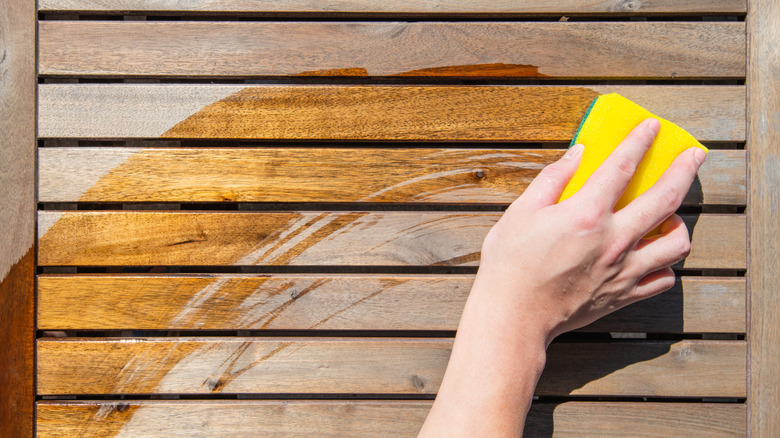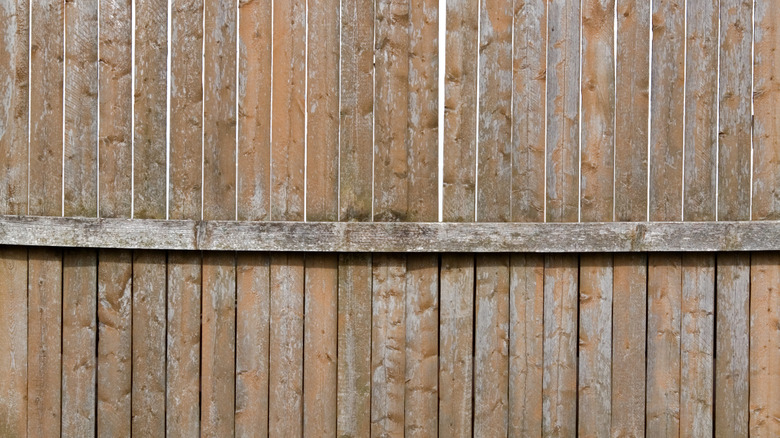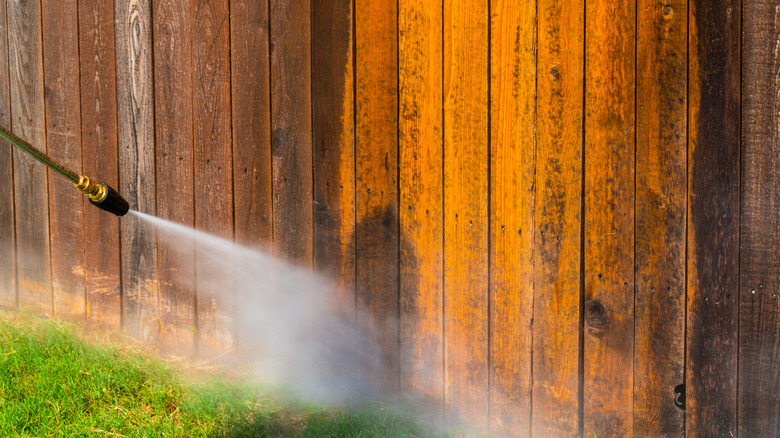Is Carpet Cleaner The Secret To Keeping Your Wood Fence Looking Like New?
We may receive a commission on purchases made from links.
When looking for wooden fence maintenance tips for keeping it pristine year-round, many homeowners seek effective and budget-friendly cleaning solutions. One idea that is frequently talked about is using carpet cleaner, which is great at tackling tough stains and grime. But it's not designed for use on wood, and there are several reasons why it can be damaging to your fence. Carpet cleaners are formulated to clean soft, absorbent materials, and they work by breaking down oils, stains, and dirt that are absorbed into the fibers.
Wood, on the other hand, is a rigid material with a natural grain that can easily absorb moisture and chemicals. Using a carpet cleaner on a wood fence can have several negative effects. First, the harsh chemicals in carpet cleaners can strip away the natural oils that protect the wood. Without these oils, the wood becomes more vulnerable to the elements, leading to potential cracking, splintering, or even warping. Additionally, carpet cleaners often contain strong detergents and solvents that can dull the color of the wood, leaving it looking faded or washed out.
Another problem with carpet cleaners is that they can leave behind a sticky residue. While this residue may not be noticeable immediately, it can attract dirt and grime over time, making your fence look dirtier faster. Additionally, this sticky layer may become a breeding ground for mold or mildew growth, especially in humid environments. For these reasons, carpet cleaners are not the best choice for keeping your wood fence looking its best.
The dangers of using harsh chemicals on a wood fence
The most important reason why you shouldn't use carpet cleaners on wooden fences is the potential damage caused by the harsh chemicals they contain. These powerful chemicals have been specifically designed to lift stains and oils from carpet fibers, the majority of which are entirely made from synthetic fibers. While there are many different types of wooden fences to consider, all natural wood requires a more gentle approach. Natural and applied oils and stains help it maintain flexibility and strength, protecting it from cracking and other types of weathering.
Carpet cleaners, however, can strip these oils and protectants away, leaving the wood dry and vulnerable. This drying effect can lead to a number of problems. Over time, wood that has been deprived of its natural oils can become brittle and prone to cracking, splintering, or warping. These physical changes not only make your fence look aged and weathered but can also reduce its structural integrity.
In the worst case, untreated wood exposed to the elements for long periods can begin to rot, which significantly shortens the lifespan of your fence. They may also alter the color of treated or stained wood, stripping away the protective coatings that help the fence resist fading from sun exposure. If your fence is left unprotected or improperly treated after using a carpet cleaner, the wood may begin to lose its natural color and appearance much more quickly.
Safer alternatives for maintaining your wood fence
Thankfully, there are several safer, more effective alternatives for cleaning your wood fence. These options not only clean the wood but also help protect it from damage caused by harsh chemicals. For starters, consider using a specialized wood fence cleaner, like Simple Green Oxy Solve. These cleaners are specifically formulated for outdoor wood surfaces, lifting dirt, mold, and grime without damaging the wood.
They are generally free from harsh chemicals that could strip away natural oils or protective coatings. If you prefer a more natural approach, a simple solution of mild soap and water is the best way to clean a wood fence without a pressure washer. Mix a small amount of dish soap with warm water, then apply it to the fence using a soft brush. This gentle approach will remove surface dirt without harming the wood.
A vinegar solution can be used, diluted at a ratio of ½ cup of vinegar to a gallon of water. Vinegar is a natural disinfectant and can help break down grime and mold; just make sure to never apply it directly to wood without diluting it. In addition to cleaning, consider applying a protective finish to your fence to make it look like new. A wood sealant or oil can help restore moisture to the wood, preventing it from drying out or becoming damaged by UV rays. These treatments can also enhance the natural color of the wood, giving your fence a vibrant, fresh look.


